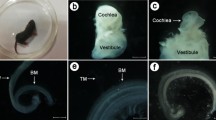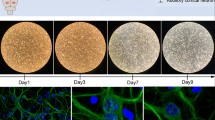Abstract
Background:
We previously showed that aging accelerates after 3 months of exposure to hypoxia and environmental change but not genetic modifications. Here, we aimed to simply induce early-onset age-related hearing loss within a short period based on our previous method.
Methods:
We randomly divided 16 C57BL/6 mice into four groups that were maintained under conditions of normoxia and hypoxia with or without injected d-galactose for 2 months. Deteriorated hearing, the expression of age-related factors, and oxidative stress responses were detected using the click and tone burst auditory brainstem response test, reverse transcription-polymerase chain reaction, and by measuring superoxide dismutase (SOD).
Results:
The group maintained under hypoxia combined with d-galactose lost hearing particularly at 24 Hz and 32 Hz at 6 weeks compared with the other groups. Aging-related factors were also significantly decreased in the hypoxia and d-galactose groups. However, SOD levels did not significantly differ among the groups.
Conclusion:
Age-related hearing loss is an environmental disorder induced by chronic oxidative stress associated with genetic backgrounds. Our findings suggested that d-galactose and hypoxia can induce the phenotypes of age-related hearing loss and aging-associated molecules in a murine model within a short time with environmental stimulation alone.






Similar content being viewed by others
References
World Health O. Addressing the rising prevalence of hearing loss. Geneva: World Health Organization; 2018.
Shen Y, Ye B, Chen P, Wang Q, Fan C, Shu Y, et al. Cognitive decline, dementia, Alzheimer’s disease and presbycusis: examination of the possible molecular mechanism. Front Neurosci. 2018;12:394.
McDaid D, Park AL, Chadha S. Estimating the global costs of hearing loss. Int J Audiol. 2021;60:162–70.
Wang J, Puel JL. Presbycusis: an update on cochlear mechanisms and therapies. J Clin Med. 2020;9:218.
Ohlemiller KK. Mouse methods and models for studies in hearing. J Acoust Soc Am. 2019;146:3668–80.
Park DJ, Ha S, Choi JS, Lee SH, Park JE, Seo YJ. Induced short-term hearing loss due to stimulation of age-related factors by intermittent hypoxia, high-fat diet, and galactose injection. Int J Mol Sci. 2020;21:7068.
Seo YJ, Ju HM, Lee SH, Kwak SH, Kang MJ, Yoon JH, et al. Damage of inner ear sensory hair cells via mitochondrial loss in a murine model of sleep apnea with chronic intermittent hypoxia. Sleep. 2017. https://doi.org/10.1093/sleep/zsx106.
Jaiganesh A, De-la-Torre P, Patel AA, Termine DJ, Velez-Cortes F, Chen C, et al. Zooming in on Cadherin-23: structural diversity and potential mechanisms of inherited deafness. Structure. 2018;26:1210-25.e4.
Manji SS, Miller KA, Williams LH, Andreasen L, Siboe M, Rose E, et al. An ENU-induced mutation of Cdh23 causes congenital hearing loss, but no vestibular dysfunction, in mice. Am J Pathol. 2011;179:903–14.
Miyasaka Y, Suzuki S, Ohshiba Y, Watanabe K, Sagara Y, Yasuda SP, et al. Compound heterozygosity of the functionally null Cdh23(v-ngt) and hypomorphic Cdh23(ahl) alleles leads to early-onset progressive hearing loss in mice. Exp Anim. 2013;62:333–46.
Guo B, Guo Q, Wang Z, Shao JB, Liu K, Du ZD, et al. d-Galactose-induced oxidative stress and mitochondrial dysfunction in the cochlear basilar membrane: an in vitro aging model. Biogerontology. 2020;21:311–23.
Yeo EJ. Hypoxia and aging. Exp Mol Med. 2019;51:1–15.
Ju HM, Lee SH, Choi JS, Seo YJ. A simple model for inducing optimal increase of SDF-1 with aminoglycoside ototoxicity. Biomed Res Int. 2017;2017:4630241.
Youn CK, Jun Y, Jo ER, Cho SI. Age-related hearing loss in C57BL/6J mice is associated with mitophagy impairment in the central auditory system. Int J Mol Sci. 2020;21:7202.
Zhao C, Yang Z, Chen Z, Liang W, Gong S, Du Z. AAV-ie-mediated UCP2 overexpression accelerates inner hair cell loss during aging in vivo. Mol Med. 2022;28:124.
Du Z, Yang Q, Zhou T, Liu L, Li S, Chen S, et al. d-galactose-induced mitochondrial DNA oxidative damage in the auditory cortex of rats. Mol Med Rep. 2014;10:2861–7.
Elham T, Ghassem M. Evaluation of the effects of chronic injection of D-galactose on auditory brainstem responses as a model for studying age-related hearing loss. Acta Med Iran. 2019;57:281–8.
Du ZD, Han SG, Qu TF, Guo B, Yu SK, Wei W, et al. Age-related insult of cochlear ribbon synapses: an early-onset contributor to d-galactose-induced aging in mice. Neurochem Int. 2020;133:104649.
Koide Y, Teranishi M, Sugiura S, Uchida Y, Nishio N, Kato K, et al. Association between uncoupling protein 2 gene Ala55val polymorphism and sudden sensorineural hearing loss. J Int Adv Otol. 2018;14:166–9.
Kim MJ, White K, Walker L, Han C, Someya S. Age-related hearing loss: mitochondrial biochemical pathways and molecular targets. In: Miller J, Le Prell CG, Rybak L, editors., et al., Free radicals in ENT pathology. Cham: Springer International Publishing; 2015. p. 273–88.
Bouzid A, Smeti I, Dhouib L, Roche M, Achour I, Khalfallah A, et al. Down-expression of P2RX2, KCNQ5, ERBB3 and SOCS3 through DNA hypermethylation in elderly women with presbycusis. Biomarkers. 2018;23:347–56.
Wang J, Shen J, Guo L, Cheng C, Chai R, Shu Y, et al. A humanized mouse model, demonstrating progressive hearing loss caused by MYO6 p.C442Y, is inherited in a semi-dominant pattern. Hear Res. 2019;379:79–88.
Seki Y, Shitara H, Ishii R, Ouchi T, Yasuda SP, Kikkawa Y. Myosin VI haploinsufficiency reduced hearing ability in mice. Neuroscience. 2021;478:100–11.
Uchida Y, Teranishi M, Nishio N, Sugiura S, Hiramatsu M, Suzuki H, et al. Endothelin-1 gene polymorphism in sudden sensorineural hearing loss. Laryngoscope. 2013;123:E59-65.
Vasilyeva ON, Frisina ST, Zhu X, Walton JP, Frisina RD. Interactions of hearing loss and diabetes mellitus in the middle age CBA/CaJ mouse model of presbycusis. Hear Res. 2009;249:44–53.
Fujita T, Yamashita D, Uehara N, Inokuchi G, Hasegawa S, Otsuki N, et al. A high-fat diet delays age-related hearing loss progression in C57BL/6J mice. PLoS One. 2015;10:e0117547.
Espino Guarch M, Font-Llitjós M, Murillo-Cuesta S, Errasti-Murugarren E, Celaya AM, Girotto G, et al. Mutations in L-type amino acid transporter-2 support SLC7A8 as a novel gene involved in age-related hearing loss. eLife. 2018;7:e31511.
Suzuki J, Inada H, Han C, Kim MJ, Kimura R, Takata Y, et al. “Passenger gene” problem in transgenic C57BL/6 mice used in hearing research. Neurosci Res. 2020;158:6–15.
Sugiura S, Uchida Y, Nakashima T, Ando F, Shimokata H. The association between gene polymorphisms in uncoupling proteins and hearing impairment in Japanese elderly. Acta Otolaryngol. 2010;130:487–92.
Liu Y, Chu H, Chen J, Zhou L, Chen Q, Yu Y, et al. Age-related change in the expression of NKCC1 in the cochlear lateral wall of C57BL/6J mice. Acta Otolaryngol. 2014;134:1047–51.
Acknowledgements
This research was supported by the Korean Fund for Regenerative Medicine(KFRM) grant funded by the Korea government(the Ministry of Science and ICT, the Ministry of Health & Welfare, 21A0101L0) and supported by "Regional Innovation Strategy (RIS)" through the National Research Foundation of Korea(NRF) funded by the Ministry of Education(MOE)(2022RIS-005).
Author information
Authors and Affiliations
Contributions
Each author had equally contributed on this study.
Corresponding author
Ethics declarations
Conflict of interest
There are none conflicts of interests according to authors.
Ethical statement
The animal studies were approved by the Institutional Animal Care and Use Committee of the Animal laboratory of Yonsei University, Wonju College of Medicine (Approval No: YWC-181001-2).
Additional information
Publisher's Note
Springer Nature remains neutral with regard to jurisdictional claims in published maps and institutional affiliations.
Supplementary Information
Below is the link to the electronic supplementary material.
Rights and permissions
Springer Nature or its licensor (e.g. a society or other partner) holds exclusive rights to this article under a publishing agreement with the author(s) or other rightsholder(s); author self-archiving of the accepted manuscript version of this article is solely governed by the terms of such publishing agreement and applicable law.
About this article
Cite this article
Batsaikhan, T., Choi, J.S., Ha, S.M. et al. d-Galactose and Hypoxia Induce the Early Onset of Age-Related Hearing Loss Deterioration in a Mouse Model. Tissue Eng Regen Med 20, 779–787 (2023). https://doi.org/10.1007/s13770-023-00547-8
Received:
Revised:
Accepted:
Published:
Issue Date:
DOI: https://doi.org/10.1007/s13770-023-00547-8




